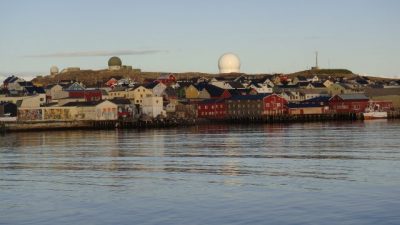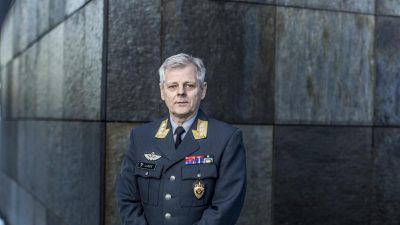Some residents of Northern Norway aren’t at all happy about the amount of intelligence gathering going on in their communities and who’s involved in it, not least in the Arctic city of Vardø. Critics were airing their concerns at a conference in Vadsø this week, but the head of Norway’s military intelligence agency E-tjenesten isn’t about to become more open.

Vardø has a long history in the Arctic, not least as a starting point for polar expeditions and a hub for trade with the Russians. More recently it’s emerged as a bird-watchers’ paradise but it’s also known for the huge radar installations that loom over the small city Norway’s most northeastern location.
For years, Vardø and other communities in Northern Norway have functioned as important listening and spying posts for Norway and its NATO allies. Reports recently emerged in Norway about how the US ran surveillance operations from an otherwise modest farmhouse at Gamvik, east of Mehamn and not far from the world’s most northerly mainlans lighthouse, Slettnes fyr. It’s now the subject of proposed preservation orders, to protect an important part of post-war history.
It’s the present, and recently heightened, level of surveillance that prompted concerned locals to mount the conference in Vadsø entitled Etterretning som demokratisk blindsone (Intelligence as a democratic blind zone). Newspaper Aftenposten reported that its organizers claim that local residents know very little about what’s happening around them and who is working for the the city’s largest employer, an intelligence gathering station. They question whether Norwegian intelligence gathering is really under democratic control.
They also point to concerns about the Vardø radar and its recent expansion plans, and fear the spying based from Northern Norway can provoke their Russian neighours to the east. One of those behind the conference, journalist Bård Wormdal who also is the author of a book about the history of the US’ CIA and NSA in Norway, claims that the public has been kept in the dark because of Norway’s military relations with the US.

Gen Lt Morten Haga Lunde, who heads the military’s intelligence gathering, acknowledges the concerns but dismisses calls for more openness. “I of course recognize that it’s a democratic right to discuss intelligence gathering,” Lunde, chief of E-tjenesten, told Aftenposten over the weekend. He objects, however, to the conference arrangers’ suggestions of a lack of democratic control.
“They argue as if time has stood still from the days of surveillance operations as they were run from 1945 to the 1970s (during the Cold War),” Lunde said, “and as if the Parliament’s EOS commission (set up to monitor and regulate spying) didn’t exist. If that (EOS) is not democratic control, then I don’t known what else it can be.” Lunde noted that the EOS commission inspects E-tjenesten five times a year and has full access to its data systems. The intelligence gathering service he runs sends open reports to the Parliament, is audited annually, has monthly meetings with the defense minister and is subject to control by the non-political boss of the defense department.
Lunde stressed that intelligence gathering must, by its very nature, be secretive, and its personnel must be protected. His main job, he said, is to prevent his intelligence gatherers from being identified and “charted” by potential enemies.
That can be dangerous, he told Aftenposten, pointing to what happened in Crimea after it was annexed by Russia two years ago. Various Ukrainian military and civil servants had been identified and charted, and were threatened or prevented from going to work. “My surveillance stations must also be able to operate in a war situation,” Lunde said. “There’s no doubt that foreign intelligence gathering organizations are trying to chart them.”
Meant to ‘stabilize,’ not ‘provoke’
Lunde claims that E-tjenesten’s secret workers carry out legal and important work for Norway. “We must also expect that others want to know their background, their education and their addresses,” Lunde said, adding that such information could be used to threaten the country, not just by “our neighbour (Russia)” but also other countries and non-governmental organizations.
“Therefore I won’t say who or how many work for me in local communities in Northern Norway,” Lunde said, “because their stations must also function in a war situation.”
Instead of being a provocation, like some residents of Northern Norway fear, Lunde claims the secret surveillance work “stabilizes the situation in the north.” He added that “we’re doing this (monitoring Russian military movements exercises, for example) to avoid landing in a conflict where weapons can be used. We’re doing this to give our decision makers (government politicians) the best foundation to make the right decisions.” He claimed that information gathered and any shared is under the control of Norwegians, “nothing goes directly out and nothing goes right into a missile defense system run by others.”
Critics remain skeptical
Wormdal and others didn’t appear convinced. “I think that instead of criticizing (this week’s) conference in advance, they could have participated,” Wormdal told Aftenposten. “They chose not to.”
Asked why it’s so important to get confirmed information about who and how many are working for military intelligence in Vardø and Vadsø, Wormdal said it was “ridiculous” for Lunde to claim that such information could damage Norway in a war situation. He conceded that he did, however, have “full understanding” that Lunde can’t be open about everything. “E-tjenesten is one of the most important things we have,” he said. He just wants more openness around it.
“We must be able to ask questions about how it works, since it’s so pervasive, and especially with consideration to the bilateral cooperation between Norway and the US aside from NATO,” Wormdal said. “To what degree have politicians been a part of forming it? We need a public discussion around it.”
He also contends that because much of the monitoring work conducted by EOS is classified, it’s not possible to know whether E-tjenesten holds back information. The Vardø radar, for example, “is an important contribution to the US’ ability to defend its satellites in outer space and attack others,” he said, suggesting that defies Norwegian politicians’ intention in 2008 that Norway should work to make sure outer space does not become an arena for war.
Regarding Norway’s bilateral relationship with the US, Lunde responded that the US “is our most important ally. We cooperate with the US and share information. They do not operate or have control over our equipment. Norwegian intelligence gathering stations are under my control and command.”
newsinenglish.no/Nina Berglund

